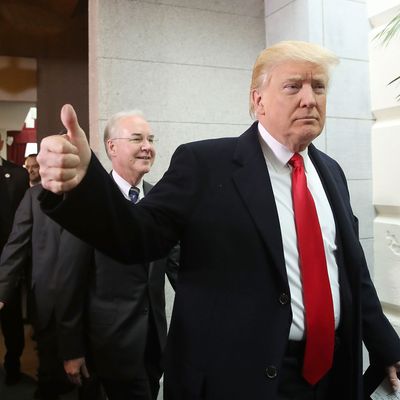
By the time Donald Trump finished failing to repeal Obamacare last month, the White House had already leaked that the president wished he’d put health care aside and started with tax reform instead.
Minutes after Paul Ryan cried uncle on the former, the House Speaker told reporters that his party would not try to repeal Obamacare again for a long time.
But over the ensuing days, the president apparently realized that tax reform was “complicated” too; or else found himself psychologically incapable of accepting defeat. Regardless, the White House and congressional Republicans began quietly negotiating over a new version of Trumpcare almost immediately. And even after those talks (predictably) failed to produce a bill acceptable to both House moderates and the Freedom Caucus, the president continued to call for action on health care before Congress turns to taxes.
“I think we’re going very well with health care,” Trump told Fox Business Network last week. “And after that, we’re going to start on tax reform and infrastructure.”
The president argued that this sequence would allow Republicans to save “tremendous amounts of money on health care” and use that savings to cut taxes more dramatically.
“If you don’t do that, you can’t put any of the savings into the tax cuts,” Trump explained.
This is essentially true. Trumpcare itself was a tax cut — the bill eliminated Obamacare’s 3.8 percent tax on investment income, and made up the lost revenue by throwing millions of poor people off of health insurance.
And if Republicans don’t cut off health care to a chunk of their voting base, then they will be forced to betray some of their economically anxious donors. As The Wall Street Journal explains:
Leaving the health law’s taxes in place — particularly the 3.8 percent tax on investment income —could pose challenges for the tax bill.
Passive owners of many businesses pay their companies’ taxes on their individual tax returns and face that 3.8 percent tax. If Republicans lower big corporations’ tax rates and leave that 3.8 percent tax, business groups will likely object that they aren’t getting parity.”
Passive owners of many businesses pay their companies’ taxes on their individual tax returns and face that 3.8 percent tax. If Republicans lower big corporations’ tax rates and leave that 3.8 percent tax, business groups will likely object that they aren’t getting parity.
So, either because the GOP feels compelled to deliver all expected dividends to their party’s shareholders — or because Trump is so sick of losing — Republicans have not fully given up on Obamacare repeal.
And to grease the skids for another push, the president’s outside group, America First Policies, will spend $3 million on ads bolstering Trumpcare’s initial supporters. As the Washington Post reports:
In a phone call, the Trump campaign veterans who run the organization described the expenditure as a gesture of appreciation to Trump’s friends in the chamber as well as a way to encourage other House Republicans to get behind the effort to revive health-care legislation.
The $3 million “advocacy campaign” will be split among the 12 Republicans beginning Monday and feature broadcast, digital and social components, the advisers said.
… The television and Web spots are titled “Repeal Now” and feature a script that praises the House members by name for “taking on Nancy Pelosi,” the House Democratic leader, and “standing with President Trump to repeal Obamacare now.”
Of course, the greatest threat to Trumpcare’s passage isn’t the wavering commitment of the president’s erstwhile allies, but the resilient opposition of the House’s moderate Republicans and far-right zealots. However, one adviser to America First Policies suggested that the group could eventually switch from carrots to sticks, telling the Post, “We’re starting positive, but all options are on the table.”
But even if Trump’s allies go on the offensive, it’s far from clear that they have the ammunition to win this fight. The Koch Brothers and conservative advocacy groups have already offered to fatten the campaign coffers of Republicans who hold out for a maximally cruel version of repeal.
Meanwhile, with Democrats outperforming expectations in early special election races, House moderates have no greater incentive to vote for an unpopular president’s unpopular health-care law today than they did last month.






























